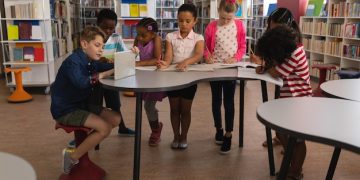National Curriculum Review: Updates & Why They Matter

The National Curriculum Review addresses evolving educational needs by updating subject content and teaching methodologies to better prepare students for future challenges and opportunities.
The educational landscape in the US is constantly evolving, and with it, so too must the curriculum. The National Curriculum Review: What Subjects Are Being Updated and Why? is a critical process that ensures our students are receiving the most relevant and effective education possible.
Understanding the National Curriculum Review Process
The National Curriculum Review is a comprehensive evaluation of the standards and content taught in schools across the nation. This review process helps determine whether the current curriculum effectively prepares students for college, careers, and civic life.
The review examines various subjects, teaching methods, and assessment strategies to identify areas that need improvement and alignment with current societal demands.
Key Goals of the Review
The primary goal is to enhance the quality and relevance of education, ensuring that students gain essential knowledge and skills.
- Improve student outcomes and achievement levels.
- Align curriculum content with national and international benchmarks.
- Prepare students for the demands of a rapidly changing job market.
- Promote critical thinking, problem-solving, and innovation.
Stakeholders Involved
The review process involves numerous stakeholders, including educators, policymakers, subject-matter experts, and community members. Their collective input ensures a well-rounded and effective curriculum.
These stakeholders collaborate through surveys, focus groups, and public hearings to gather diverse perspectives and insights.

Core Subjects Undergoing Updates
Several core subjects are frequently updated as part of the National Curriculum Review. These subjects include math, science, English language arts, and social studies. These updates reflect new research findings, technological advancements, and societal shifts.
The goal is to ensure that students receive a comprehensive and well-rounded education that prepares them for future success.
Mathematics
Mathematics education is evolving to emphasize problem-solving, critical thinking, and real-world applications. Updates include incorporating more data analysis, statistics, and computational thinking.
The focus is on developing students’ mathematical reasoning skills, enabling them to apply these concepts in various contexts.
Science
Science curriculum updates often align with the Next Generation Science Standards (NGSS), emphasizing hands-on learning, inquiry-based investigations, and interdisciplinary connections.
Students engage in scientific practices, such as designing experiments, analyzing data, and constructing explanations based on evidence.
English Language Arts
English language arts (ELA) updates focus on enhancing students’ reading comprehension, writing proficiency, and communication skills. These updates include a broader range of texts and genres.
There is an emphasis on developing media literacy and critical analysis skills to help students navigate the digital age.
Social Studies
Social studies curriculum updates aim to foster civic engagement, historical understanding, and global awareness. Students explore diverse perspectives.
The curriculum encourages students to critically analyze historical events, understand current social issues, and participate in democratic processes.
These frequent updates underscore the commitment to providing students with a current, relevant, and effective education.
Adapting to Technological Advancements
Technology plays a crucial role in modern education, and curriculum updates often reflect the need to integrate digital tools and resources effectively. These adaptations prepare students for a technology-driven world.
Integrating technology into the curriculum enhances student engagement, provides access to vast information resources, and fosters digital literacy skills.
- Incorporating digital literacy and online safety into the curriculum.
- Using technology to personalize learning experiences.
- Developing students’ coding and computational thinking skills.
- Utilizing virtual and augmented reality to enhance understanding.
Coding and Computational Thinking
Coding and computational thinking are becoming increasingly important skills. Many curricula are now integrating coding and programming concepts from an early age.
This integration equips students with the fundamental skills needed for future careers in technology and related fields.
Online Learning and Digital Resources
The rise of online learning and digital resources has necessitated curriculum updates. These updates ensure students can navigate and utilize online platforms effectively.

The curriculum includes guidelines for evaluating online sources, promoting responsible digital citizenship, and preventing cyberbullying.
Addressing Societal and Cultural Shifts
Curriculum reviews often address societal and cultural shifts to ensure education remains relevant and inclusive. These shifts include increasing diversity, evolving social norms, and a greater emphasis on social-emotional learning.
By addressing these shifts, the curriculum promotes understanding, empathy, and respect for diverse perspectives.
Diversity and Inclusion
Curriculum updates incorporate diverse perspectives, histories, and cultures. This ensures that all students see themselves reflected in the curriculum.
The goal is to create a more inclusive and equitable learning environment that values diversity and promotes understanding.
Social-Emotional Learning (SEL)
Social-emotional learning (SEL) is increasingly recognized as a critical component of education. Curriculum updates focus on developing students’ emotional intelligence, empathy, and interpersonal skills.
SEL programs teach students to manage emotions, build positive relationships, make responsible decisions, and handle challenging situations effectively.
The Role of Assessments in Curriculum Review
Assessments play a vital role in the National Curriculum Review by providing data on student learning outcomes and the effectiveness of the curriculum. They help identify areas where students excel or struggle.
Assessments inform curriculum adjustments, teaching strategies, and resource allocation.
Types of Assessments
Various assessment methods are used, including standardized tests, classroom-based assessments, performance tasks, and portfolio assessments.
Each type of assessment provides unique insights into student learning and progress.
- Formative assessments to monitor ongoing learning and provide feedback.
- Summative assessments to evaluate overall learning outcomes.
- Diagnostic assessments to identify specific learning needs.
Using Assessment Data
Assessment data is used to evaluate curriculum alignment, identify gaps in instruction, and inform professional development for teachers.
The data also helps policymakers make informed decisions about resource allocation and educational reforms.
Future Trends in Curriculum Development
Curriculum development is a dynamic field, and several future trends are shaping the direction of education. These trends include personalized learning, competency-based education, and global collaboration.
These trends aim to create more flexible, relevant, and effective learning experiences for all students.
Personalized Learning
Personalized learning tailors instruction to meet the unique needs and interests of each student. Technology and data analytics play an essential role in this approach.
Students have greater control over their learning path, pace, and content, leading to increased engagement and achievement.
Competency-Based Education
Competency-based education focuses on mastering specific skills and knowledge rather than accumulating seat time. Students progress at their own pace.
This approach ensures that students acquire a deep and lasting understanding of the material.
Global Collaboration
Global collaboration involves connecting students and educators across borders to share ideas, resources, and best practices. This fosters global awareness.
Students engage in collaborative projects, virtual exchanges, and cross-cultural learning experiences, preparing them to be global citizens.
| Key Point | Brief Description |
|---|---|
| 🔄 Curriculum Updates | Ensuring education remains relevant and effective. |
| 💻 Tech Integration | Adapting to digital tools for enhanced learning. |
| 🌍 Societal Shifts | Addressing diversity and social-emotional learning. |
| 📊 Assessments | Using data to improve curriculum effectiveness. |
Frequently Asked Questions (FAQ)
▼
The National Curriculum Review is a process that evaluates education standards to ensure students get relevant, effective instruction, preparing them for future challenges and opportunities in college, careers, and civic life.
▼
Core subjects like mathematics, science, English language arts, and social studies are frequently updated to reflect new research, technological advancements, and societal shifts, ensuring a comprehensive education.
▼
Technology integration enhances engagement by offering digital tools and resources, coding education, and personalized learning, preparing students for a technology-driven future and improving digital literacy.
▼
SEL is crucial for developing emotional intelligence, empathy, and interpersonal skills which helps students manage emotions, build positive relationships, and make responsible decisions, promoting overall well-being.
▼
Assessments provide essential data on student learning outcomes, which helps identify strengths and weaknesses in the curriculum. This guides informed decisions on what adjustments are need to improve instructional strategies.
Conclusion
The National Curriculum Review: What Subjects Are Being Updated and Why? underscores a commitment to providing students with a relevant, effective, and forward-thinking education. By continuously adapting to technological advancements, societal shifts, and assessment insights, the curriculum ensures that students are well-prepared to meet the challenges and opportunities of the future.





